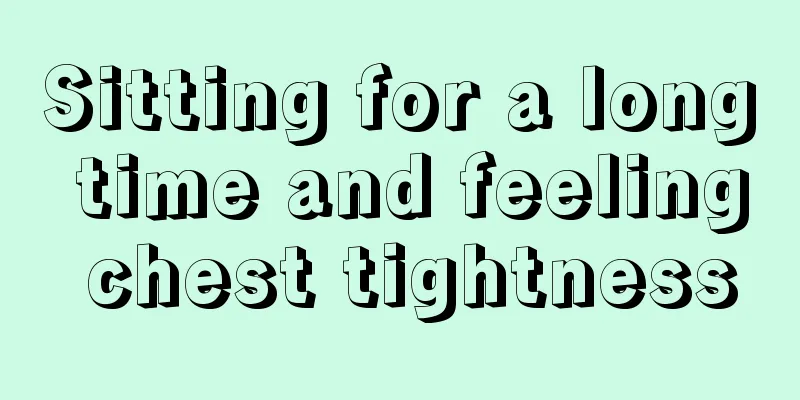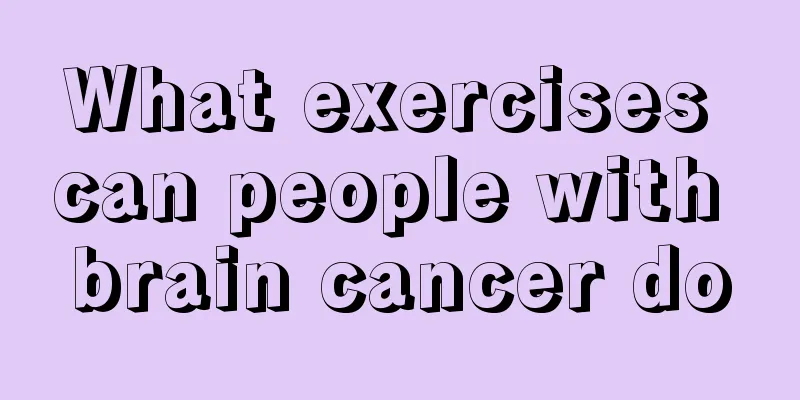Sitting for a long time and feeling chest tightness

|
Many people envy office workers because they stay in air-conditioned rooms for a long time and do not need to walk around, they can just sit in front of the computer to work. But office workers also have their own worries, because long periods of sitting can easily cause some physical problems. Sitting for a long time can also cause the problem of overfatigue. Some people become overtired after sitting for a long time and find that their chest feels a little stuffy. So what causes this phenomenon? 1. What exactly is wrong with chest tightness caused by sitting for a long time? Because the body has been in a relatively static state, the body's demand on the heart's workload is reduced and blood circulation slows down. It will cause the heart function to decline, leading to myocardial weakness and atrophy, thereby causing hypertension, and laying the foundation for cardiovascular diseases such as arteriosclerosis, coronary embolism, and coronary heart disease. Especially for middle-aged and elderly people suffering from diseases such as arteriosclerosis, slow blood circulation caused by sitting for a long time is most likely to induce myocardial infarction and cerebral thrombosis. 2. What should I do if I have cardiovascular or cerebrovascular disease or emergency heart warning symptoms? 1. Don’t get up too quickly Getting up too quickly puts more strain on your heart. Because when the human body is awake, stress hormones such as adrenaline will be secreted, blood pressure will rise accordingly, and oxygen consumption will increase. When you wake up, your body is in a dehydrated state, the blood concentration is higher and it is more difficult to flow, causing orthostatic hypotension with symptoms of dizziness. However, such low blood pressure will reflexively stimulate and activate the sympathetic nervous system, thereby increasing the heart rate and blood pressure. The drastic changes in blood pressure, such as sudden drop and sudden rise, put a heavy burden on blood vessels and the heart. Studies have also found that the risk of heart attack in the early morning increases by 40%. 2. Supplement potassium Potassium regulates heart rhythm, nerve transmission, and muscle contraction. Potassium ions can promote the excretion of sodium ions, dilate blood vessels, lower blood pressure, and prevent cholesterol from depositing in the arteries, thereby protecting blood vessels. Potassium is abundant in potatoes, taro, red dates, raisins, white fungus, etc., while white mushrooms and Chinese cabbage have the highest potassium content. 3. The necessity of “napping” Taking a nap is a good way for cardiovascular and cerebrovascular patients to take a short rest. Don’t wait until you are exhausted to think about taking a nap, because your heart will already be overloaded by then! Taking a nap can relax the cardiovascular system and reduce tension in the body. |
<<: What anti-inflammatory medicine should I take for cough and itchy throat
>>: Rotten watermelon causes diarrhea
Recommend
What are the basic items of liver function test?
There are many ways to test liver function, and a...
What medicine is good for removing dampness?
It is very easy for dampness to appear in the hum...
What causes glioma
Glioma is a malignant tumor in the brain. At pres...
Does the electric heater have radiation?
Electric heaters are household appliances used by...
Why do my calves itch in the summer
Itchy calves in summer is a problem that many peo...
What is the reason for slow hangover sobering
Alcohol has a great impact on the human liver, so...
What is the reason for sudden watery bowel movements
Sudden watery stool is caused by excessive diarrh...
Blueberry Allergy Symptoms
Generally, when we eat fruits, we may be allergic...
What are the dangers of memory foam pillows
Nowadays, people's living standards have impr...
One ear feels blocked?
One ear seems to be blocked. This situation is pr...
Understand the causes of prostate cancer
What are the causes of prostate cancer? When it c...
Are prolactinomas serious?
Prolactinoma is certainly a serious problem becau...
Which breast cancer classification is best
The classification of breast cancer is not the be...
Does nasopharyngeal cancer mean something is growing inside?
Does nasopharyngeal cancer mean something is grow...
What are some tips for drinking water?
Autumn and winter are relatively drier seasons, e...









